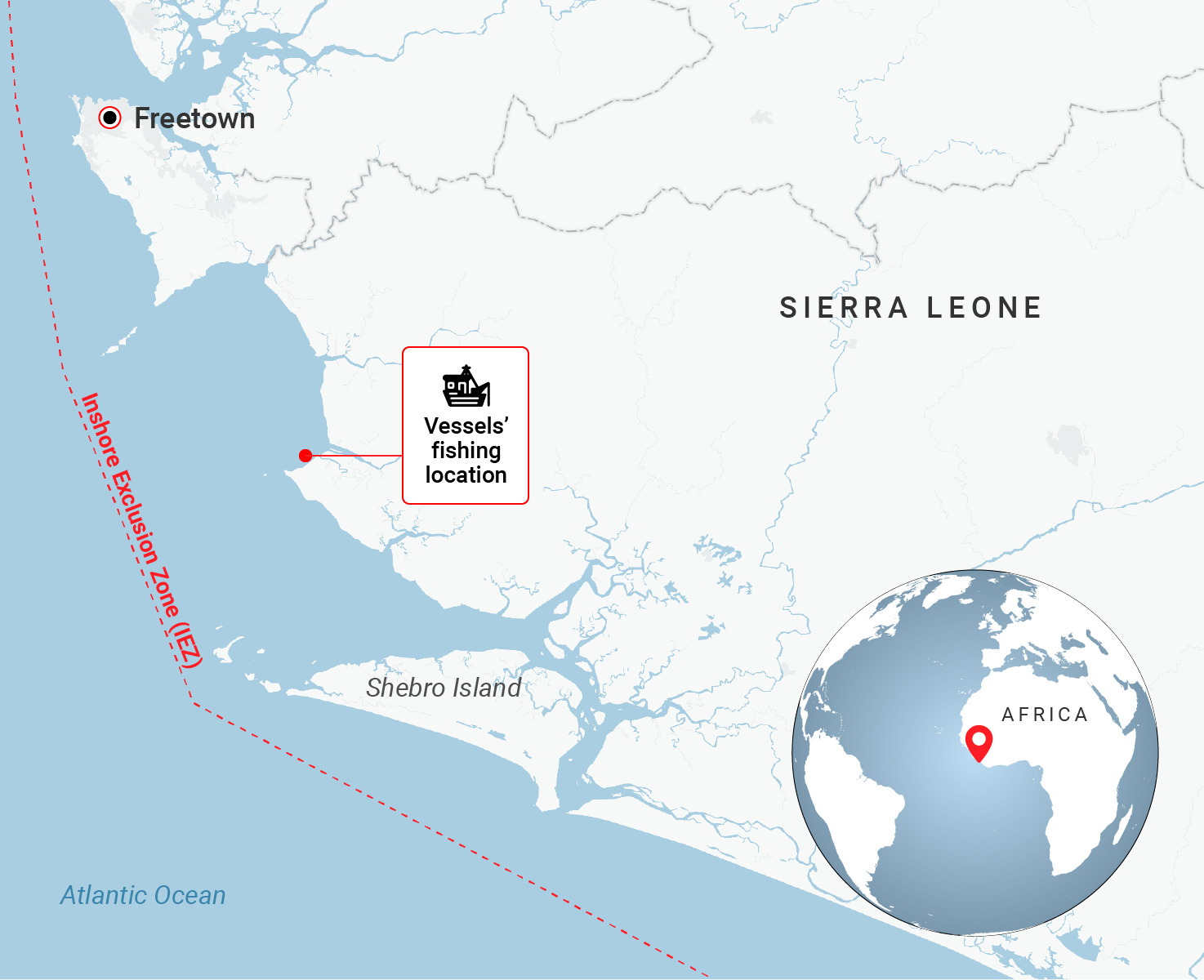Witnesses claim these trawlers can be seen fishing in the protected zone almost every day with authorities not even trying to stop them.
The West African coastal waters are home to some of the world’s richest fish stocks, which are, however, being increasingly depleted because of illegal fishing and unsustainable fishing practices.
The incident took place on June 19 just a few days after OCCRP exposed flaws in Sierra Leone’s vessel monitoring system. The two trawlers were recorded dragging fishing nets behind them off the coast in the Yawri Bay marine protected area in southern Sierra Leone.
The vessels have been caught on video by a local captain who preferred to remain anonymous for security reasons. Geolocated and dated, the footage was sent to OCCRP.
To protect the marine environment, Sierra Leone, like many other coastal nations, designates a so-called inshore exclusion zone, known as an ‘IEZ’ – an area along the shore reserved exclusively for artisanal fishermen. This is because coastal waters are critical to fish breeding and development, which can be easily disrupted by industrial fishing.
The Sierra Leonean IEZ covers waters up to around six nautical miles, or 11 kilometers, from the shoreline. Industrial fishing vessels intruding into the zone face fines starting at hundreds of thousands of dollars according to Sierra Leone’s 2018 Fisheries and Aquaculture Act.
Sierra Leone also maintains four marine protected areas comprising major river mouths and mangrove forests, which are part of the IEZ but are given a special status for their unique and vulnerable biodiversity.
The videos show detailed features of the two trawlers and also reveal a part of their names – both start with ‘Friendship’, which is followed by unidentified numbers.
Sierra Leone’s Ministry of Fisheries refused to answer specific questions about the incident. But the Spokesman of the Sierra Leone Artisanal Fishermen Union, Woodie Koroma, whom reporters consulted the video recording with, alleged that the vessels belong to a company registered in Sierra Leone as Red Sea (Salone) Fisheries Development Limited.
The same was asserted by five other sources closely familiar with Sierra Leone’s fishing sector.
Red Sea is a Sierra Leonean subsidiary of Tianjin Hongyang Food Trading Company Limited headquartered in northern China according to information on the latter’s website.
Reporters visited Red Sea’s base in Freetown, the capital of Sierra Leone, to verify whether the trawlers are indeed operated by the company. Kelvin, the company’s manager who only provided his first name, denied Red Sea was anyhow associated with the vessels.
But reporters spotted and photographed two identical vessels offloading their catch at Red Sea’s private jetty during the same visit. Sources working in the area suggested that these vessels come to the jetty regularly.
The June 19 incident does not seem to be the only occasion the two trawlers ventured into the IEZ. The captain who took the recording alleged that he had been seeing identical vessels fishing in the IEZ almost on a daily basis in recent years.
Koroma confirmed the information. “They come even in broad daylight. They have no fear,” he said.
OCCRP reported in June that even vessels equipped with the vessel monitoring system, or ‘VMS’, were fishing in the IEZ. According to previous claims by the Ministry of Fisheries, the VMS should guarantee that all vessels registered to fish in Sierra Leone are constantly tracked by ministry officials.
The two trawlers also appear to be equipped with VMS devices, as shown in the videos.
Koroma suggested this could be because Red Sea was conniving with the authorities. “They work in close contact with the navy military personnel guarding the waters,” he said.
Earlier this year, OCCRP spoke to over a dozen fishermen in nine different settlements along Sierra Leone’s coast. They consistently reported falling catches in recent years, saying they have to work longer hours and fish further and further from the coast to provide for their families.
“We blame the Ministry of Fisheries. They refuse to do anything about the trawlers coming inshore,” said Suliman Kamara, a fisherman from the fishing settlement of Banda north of the capital Freetown.



